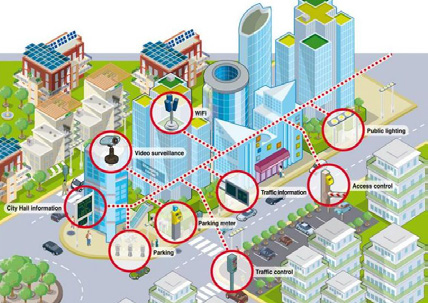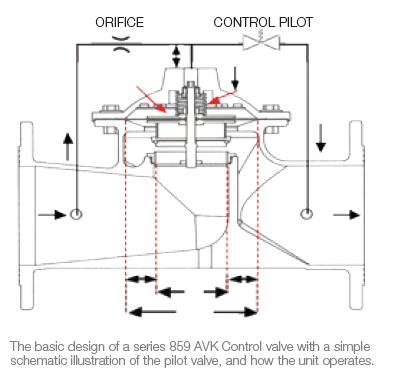
Smart city
Throughout the world, we see an increasing urbanisation, and the fast-growing population in the cities poses challenges for infrastructure and environment 01-09-2016
A SMART city is a place where traditional network and services are made more efficient with the use of digital and telecommunication technologies, and thus improving the quality of life for citizens and making cities more sustainable for the benefit of its inhabitants and businesses.
A smart concept
The SMART city concept aims at better use of resources and less emissions. It means smarter urban transport networks, upgraded water supply and waste disposal facilities, and more efficient ways to light and heat buildings. And it also encompasses a more interactive and responsive city administration and safer public spaces.

Image source: The Case for Smart City Communications White Paper by Ventura Next for MEFC
Water and wastewater are part of the infrastructure, and AVK has several products to offer in connection with sustainable SMART water management. In order to make a water supply intelligent, it is necessary to control the supply system like water pressure, water quality and pollution. The challenges are to streamline the operation, maintain and increase safety of the supply net and water quality and at the same time protect the environment and water source.
Real time data can be used to identify the status of a water distribution system at a particular point in time. By archiving such data, analysis can be performed to identify various performance trends under different conditions. Use of real time data can be further used to evaluate the performance of the system under different conditions and adjust accordingly, if required.
Also, urbanisation and the impact of global climate change are accelerating water scarcity for cities around the world. Securing enough water for a growing population requires more efficient management of freshwater supply.
In order to mitigate water scarcity, it is important that waterworks minimize water losses. Non-revenue water is a huge source of wastage through leaks, theft, or metering inaccuracies in utility networks and therefore, reducing water loss is very important. Using control valves, the waterworks can focus on conducting an economically advantageous activity; i.e. reducing pressure to a minimum during night when the water consumption is low. This could be by use of an automatic control valve series 859 from AVK which can be easily altered to suit different functions and applications.

How does a control valve function?
A control valve is designed for controlling pressure, flow, volume, water level, or temperature, and can be split in two groups; a self-acting valve under which a pilot operated is counted and a control valve with secondary energy like electrical power or compressed air.
In this context, we deal with the self-acting pilot operated type set up as a pressure reducing valve. The pressure reducing valve is automatically reducing a higher inlet pressure to a lower downstream pressure regardless of changes in flow rate or inlet pressure.
The basic idea of how a control valve works is to load a certain force by means of a spring on one side of a diaphragm, and let the controlled downstream pressure work as force on the other side of the diaphragm. When the two forces outbalance each other, the downstream pressure is set. To change the downstream pressure, you need to adjust the spring force and this is done manually.
If we want the SMART aspect to come into the picture, we need to remove the spring and put something automatic instead. And this is exactly what we do. Instead of using a handle and spring, we put some automation in place that can receive input from the SCADA (Supervisory Control And Data Acquisition) system to put more or less force on the diaphragm, and thus lower or increase the downstream pressure. Now we have a control valve that can communicate with the SCADA system which again communicates with other equipment like water meters and pumps and in this way, the products are communicating with each other based on real time data.
AVK is offering products to sustainable SMART water management.
By Michael Ramlau-Hansen, Global Brand Manager, AVK Holding A/S